A French start-up and some industrial design students have found a way to recycle old computers into "new" ones using plastic jerrycans.

It takes a simple plastic fuel container and parts from an old computer - its motherboard and hard drive - to build a "Jerry", a rudimentary computer named after the jerrycan at its heart.
Most of a computer's ecological impact takes place during production. According to the United Nations University, building a typical desktop computer requires 240kg of fossil fuels, 22kg of chemicals and 1,500kg of water.
In 2010, Hedera Technology, a French start-up, asked students from the ENSCI, an industrial design school in Paris, to help create something that could reduce the environmental impact and be used in developing countries.
The team wanted to build light, portable servers with easily available material that would resist rain and mud. "That's how we thought of a container," said Mr Jérémie Bourdoncle, chief executive officer of Hedera. "With material you can find everywhere, you can actually make a computer."
Mr Romain Chanut, a co-founder of the project, set up the "Jerry Do It Together" association and started a blog to share Jerry's user manual. The association aimed to reach people living far from urban centres who do not have easy access to computers or the Internet. Since then, it has spread throughout West Africa and beyond, sharing knowledge and offering basic computers to villagers who could not otherwise afford them.
Jerry is not just a do-it-yourself project, but also a do-it-together idea. Said Mr Chanut: "What matters is that they come from the people, not from mass production."
VALENTINE PASQUESOONE/SPARKNEWS

